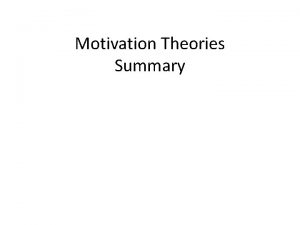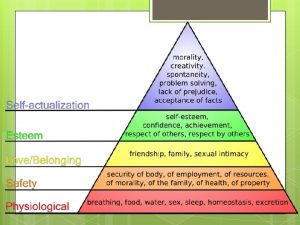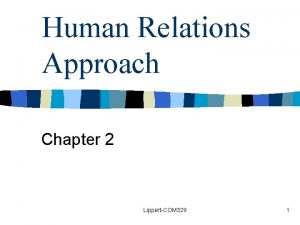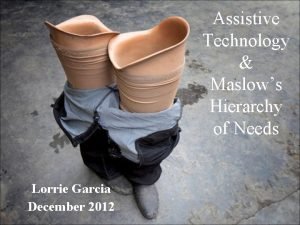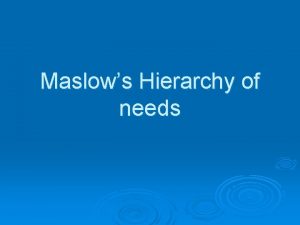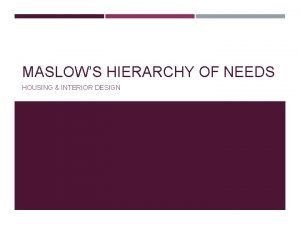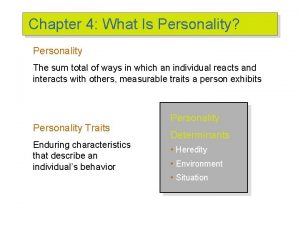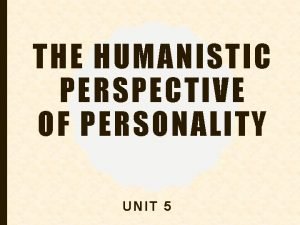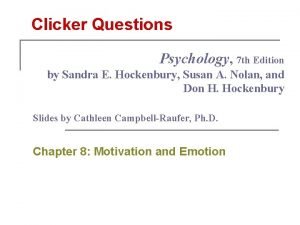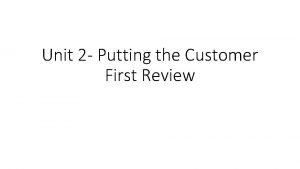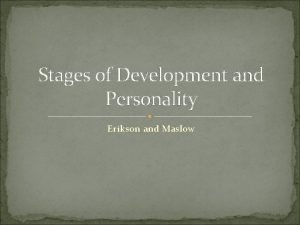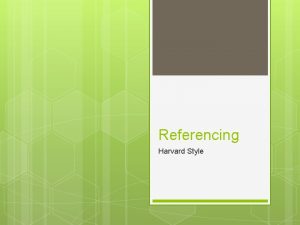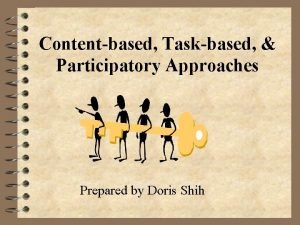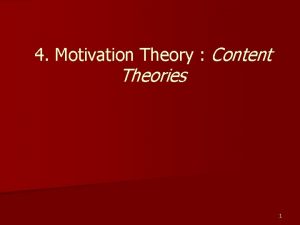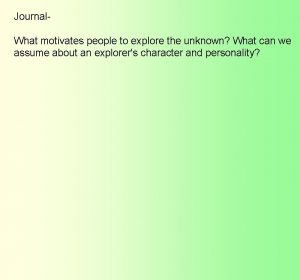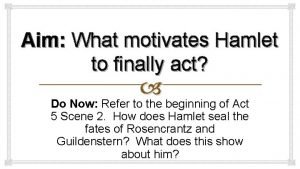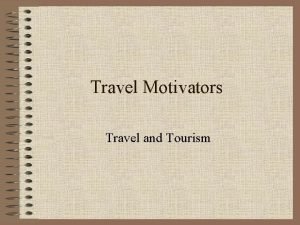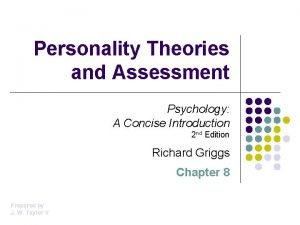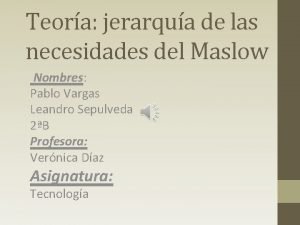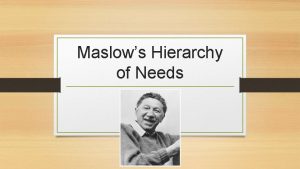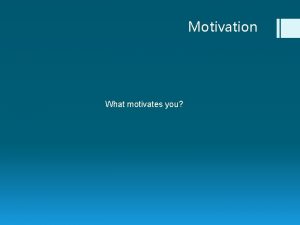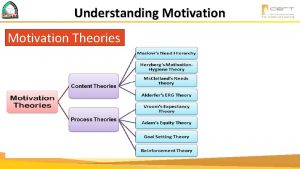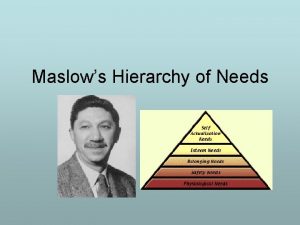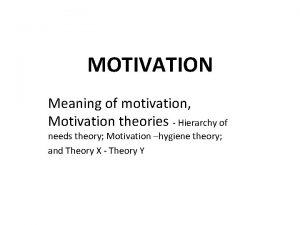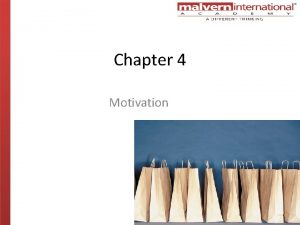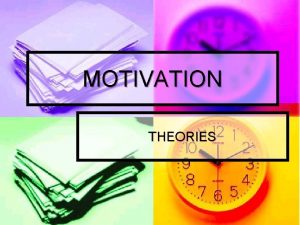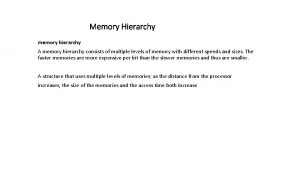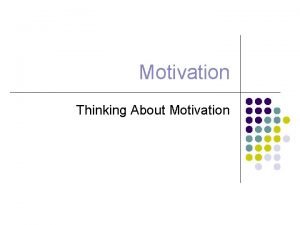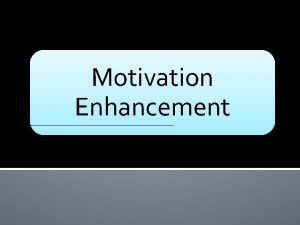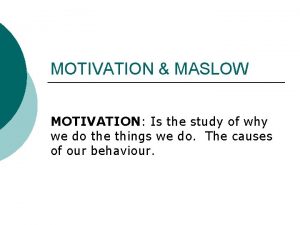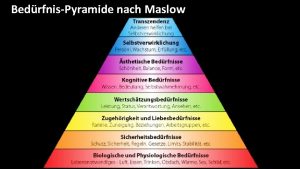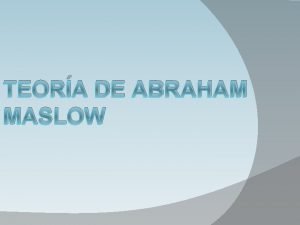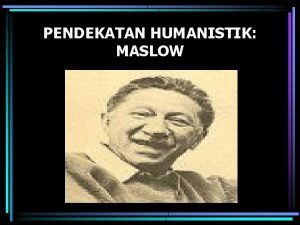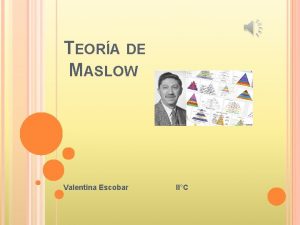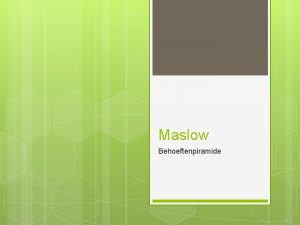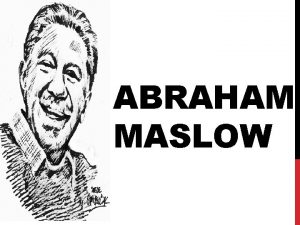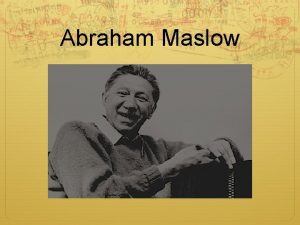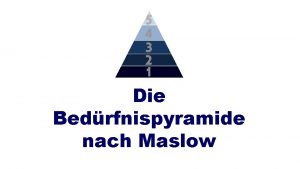Motivation Content Approaches What motivates us MASLOW HIERARCHY































- Slides: 31

Motivation: Content Approaches What motivates us?

MASLOW HIERARCHY OF NEEDS FULFILLMENT ESTEEM SOCIAL SAFETY PHYSICAL

MASLOW vs. Satisfaction HERZBERG Satisfaction FULFILLMENT SATISFIERS ESTEEM SOCIAL 0 HYGIENE FACTORS SAFETY PHYSICAL 0 Dis. Satisfactio n

Motivation and Job Enrichment Hygiene Factors job surroundings supervision benefits pay / salary Motivators what people do • Work itself • achievement • advancement • opportunity for learning • challenge / growth • feedback of results • recognition • responsibility Policies & practices Working conditions security Interpersonal relationships

Job Characteristics Model Core Job Dimensions Skill Variety Task Identity Task Significance Psychological States Meaningful Work Autonomy Responsibility for outcome Feedback Knowledge of results

Psychological States Work Outcomes High Motivation Meaningful Work High Quality Work Responsibility for outcome High Satisfaction Knowledge of results Low Absenteeism and Turnover

Job Module Design BOSS Job enrichment Job enlargement before JOB after

Task Advancement BOSS before JOB after

Alderfer’s ERG Theory Existence Growth Relatedness

Need for Achievement (n. Ach) Theory of Needs Need for Power (n. Pow) Need for Affiliation (n. Aff) David Mc. Clelland

Cognitive Evaluation Intrinsic Motivators Extrinsic Motivators

Goal-Setting Theory • Specificity • Commitment • Challenge • Self-efficacy • Feedback • Characteristics • Participation • Culture

Reinforcement Theory Rewards Consequences No Rewards Punishment Behavior

Motivation: Process Approaches How does motivation work?

Equity Theory Pay, benefits, opportunities, etc. OUTCOME INPUTS the same more or less <=> ? OUTCOME INPUTS effort, ability, experience etc. A person evaluates fairness by comparing their ratio with others. IRWIN ©a Times Mirror Higher Education Group, Inc. , company, 1997

Equity Theory Ratio Comparison* Outcomes A < Inputs A Outcomes A Inputs A *Where Outcomes B Inequity (Under-Rewarded) Inputs B = Inputs A Outcomes A Employee’s Perception Outcomes B Equity Inputs B > Outcomes B Inequity (Over-Rewarded) Inputs B A is the employee, and B is a relevant other or referent.

Research into Equity Distributive Justice Procedural Justice Amount and Allocation of Rewards Perceived Fairness of the Distribution Process

Expectancy Theory expectancy? Effort instrumentality? Performance valence? Motivation = E * I * V

Expectancy Theory Individual Effort 1 Individual Performance 2 Organizational Rewards 3 1. Effort-performance relationship 2. Performance-rewards relationship 3. Rewards-personal goals relationship Personal Goals

Performance Dimensions Ability Performance Motivation Opportunity

An Integrative Model of Motivation High n. Ach Equity Comparison O O IA IB Ability Opportunity Individual Effort Performance Appraisal Criteria Individual Performance Appraisal System Organization Rewards Reinforcement Goals Direct Behavior Personal Goals Dominant Needs

Motivation Theories Are Culture Bound Hierarchy of Needs Need for Achievement Equity Theory

MBO: Cascading of Objectives Organizational Objectives Divisional Objectives Departmental Objectives Individual Objectives The XYZ Company Consumer Products Production Sales Customer Service Industrial Products Marketing Research Development

Key Elements of MBO Goal Specificity Participation in Decision Making Explicit Time Period Performance Feedback

Linking MBO and Goal-Setting Theory Difficulty of Goals Specificity of Goals Feedback on Performance Participation in Goal Setting

Employee Recognition Programs Defining Recognition & Reinforcement Recognition Plans in Practice

Employee Involvement Programs Participative Management Representative Participation Quality Circles Employee Stock Ownership

Piece Rate Profit Sharing Variable Pay Plans Gainsharing Bonus Plans

Skill-Based Pay Plans • Promotes Flexibility Advantages • Facilitates Communication • Satisfies Ambitious Workers • “Topping Out” Disadvantages • Obsolescence of Skills • Performance versus Skills

Flexible Benefits Employees Choose From A Menu of Options • Expectancy Theory • Cost of Management • Individual Needs • Cost of Premiums

Special Motivation Issues • Professionals • Contingent workers • Diversified workforce • Low-skilled service workers • Highly repetitive tasks
 Shelter maslow's hierarchy
Shelter maslow's hierarchy Abraham maslow hierarchy of needs summary
Abraham maslow hierarchy of needs summary Maslow hierarchy of needs
Maslow hierarchy of needs Who is maslo
Who is maslo Abraham maslow developed his hierarchy of needs
Abraham maslow developed his hierarchy of needs Maslow's hierarchy of needs technology
Maslow's hierarchy of needs technology Maslow's hierarchy of needs entertainment
Maslow's hierarchy of needs entertainment Hierarchy in interior design
Hierarchy in interior design Order of maslow's hierarchy of needs
Order of maslow's hierarchy of needs Humanistic perspective on personality
Humanistic perspective on personality The lowest level in maslow's hierarchy of needs emphasizes:
The lowest level in maslow's hierarchy of needs emphasizes: The peak of maslow's hierarchy of needs pyramid represents
The peak of maslow's hierarchy of needs pyramid represents Maslow's hierarchy of needs parenting
Maslow's hierarchy of needs parenting Maslow vs erikson
Maslow vs erikson Video on maslow's hierarchy of needs
Video on maslow's hierarchy of needs Maslow's hierarchy of needs harvard reference
Maslow's hierarchy of needs harvard reference Content based task based and participatory approaches
Content based task based and participatory approaches Content theories of motivation
Content theories of motivation Tujuan pengajaran
Tujuan pengajaran What motivates people to explore
What motivates people to explore What motivates you
What motivates you What motivates both fortunato and the narrator
What motivates both fortunato and the narrator Does hamlet die
Does hamlet die The detectives need more time to inquire
The detectives need more time to inquire What motivates you to travel
What motivates you to travel Characteristics of esp
Characteristics of esp Dynamic content vs static content
Dynamic content vs static content Basisbehoeften kind maslow
Basisbehoeften kind maslow Si tu mets ceux qui brassent de l'air
Si tu mets ceux qui brassent de l'air Physiological needs according to maslow
Physiological needs according to maslow Humanistic approach abraham maslow
Humanistic approach abraham maslow Jerarqua
Jerarqua

